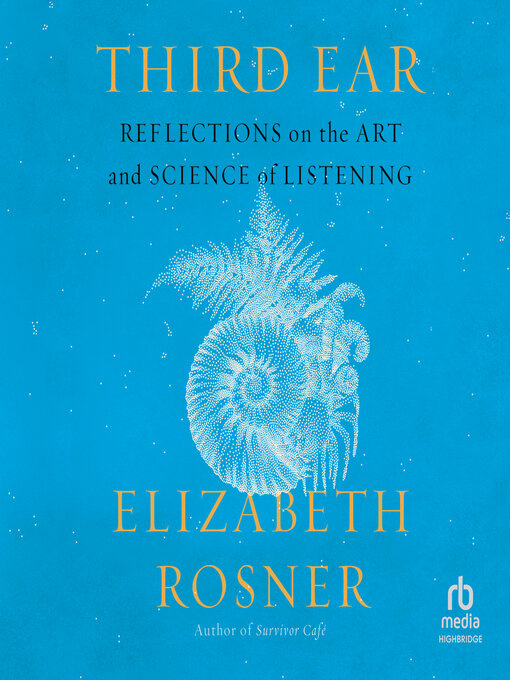Third Ear
Reflections on the Art and Science of Listening
Third Ear braids together personal narrative with scholarly inquiry to examine the power of listening to build interpersonal empathy and social transformation. A daughter of Holocaust survivors, Rosner shares stories from growing up in a home where six languages were spoken to interrogate how psychotherapy, neurolinguistics, and creativity can illuminate the complex ways we are impacted by the sounds and silences of others.
Drawing on expertise from journalists, podcasters, performers, translators, acoustic biologists, spiritual leaders, composers, and educators, this hybrid text moves fluidly along a spectrum from molecular to global to reveal how third-ear listening can be a collective means for increased understanding and connection to the natural world.
-
Creators
-
Publisher
-
Release date
October 15, 2024 -
Formats
-
OverDrive Listen audiobook
- ISBN: 9781696617239
- File size: 213217 KB
- Duration: 07:24:11
-
-
Languages
- English
-
Reviews
-
Publisher's Weekly
July 8, 2024
“Dialogue is happening all around us,” according to this lyrical blend of memoir and science. Novelist Rosner (Survivor Café), the daughter of German- and Polish-born Holocaust survivors, recounts growing up in a multilingual household in Upstate New York, where her parents’ accents marked them as outsiders. Recalling how she and her parents have struggled to listen to each other, Rosner describes how when she was a child, she covered her ears and chanted “English” whenever her mother tried to sing Russian lullabies, and contends that her parents coped with trauma from WWII by yelling at her. Though her mother died suddenly at age 70 before Rosner had a chance to make amends, she suggests that her relationship with her father improved toward the end of his life and offers a poignant account of listening with him to the audiobook of Survivor Café, which Rosner wrote about his experiences at Buchenwald. Interspersed with the personal narrative are passages about sound’s role in the natural world; for instance, Rosner explains that humpback whales “compose ever-changing songs to communicate,” and that elephants can “talk” by making rumbling noises other elephants detect through their feet. Rosner justifies the unlikely juxtaposition of personal recollections and animal trivia by suggesting that both demonstrate how, in the words of naturalist David G. Haskell, “to listen... is to be open to the vitality and creativity of life.” This soothes the soul.
-
Formats
- OverDrive Listen audiobook
subjects
Languages
- English
Loading
Why is availability limited?
×Availability can change throughout the month based on the library's budget. You can still place a hold on the title, and your hold will be automatically filled as soon as the title is available again.
The Kindle Book format for this title is not supported on:
×Read-along ebook
×The OverDrive Read format of this ebook has professional narration that plays while you read in your browser. Learn more here.

